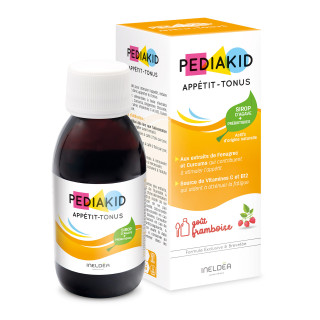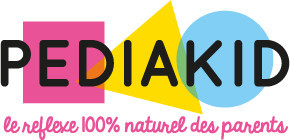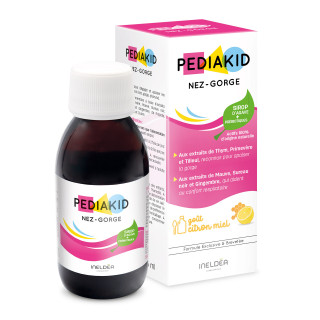- Promo

Soothes the cough (dry or wet) soothes sore throat made with plant extracts (thyme, plantain, helichrysum, ivy and pelargonium)
Colds are inevitable in winter, both in children and adults, as they are so contagious. This illness is unpleasant as it causes headaches, sore throat, coughing and a blocked nose which becomes hypersensitive as a result of being constantly blown. Before resorting to medication, it is a good idea to try natural solutions first which are just as effective. While cold symptoms are annoying, they are harmless and it is always preferable to avoid the use of « chemical medication ».
By following our six tips to treat your child’s cold, you will discover that symptoms disappear within a week, the same time as it takes with conventional allopathic treatment.
1. SANITISE THE HOUSE
Sanitising the air in your house applies to everybody and at all times of the year. Polluted air that is not replaced is a breeding ground for bacteria and viruses, especially during winter. You should therefor ventilate every day to renew the air. It is also important to track down any humid areas as this creates a breeding ground for bacteria. Here are a few simple tips to sanitise the air in your house.
Essential oils
Essential oils diffused into the air are highly effective, in addition to smelling very pleasant. Out of the huge choice available, the two most efficient are eucalyptus radiata essential oil and officinal lavender essential oil. The latter is primarily soothing and promotes sleep which is often disrupted and uncomfortable when you have a blocked nose and a cough.
These two oils have powerful antiseptic, antibacterial and antiviral activity. All that is needed is to put a few drops in a diffuser.
Black soap and white vinegar
Avoid chemical products as much as possible as they invade your atmosphere. They are damaging and affect your respiratory system as well as your immune system, without you even being aware of this.
Use much more traditional products that have no harmful emanations. Black soap and white vinegar can be used for everything, are highly effective and, the cherry on the cake, are the least expensive products you will find in the shops.
Thyme infusion
The final tip for sanitising the air inside your house is a thyme infusion. Place some thyme leaves in boiling water and the vapour which is released will sanitise the atmosphere and soothe the airways.
Now that the air in your house is pure, let’s move on to other tips to give your child some relief from a cold.
2. CARRY OUT NOSE WASHING
The first symptoms of a cold are a blocked and/or runny nose. Washing the nose helps eliminate the maximum number of microbes and to do this, you can use seawater spray. Rich in trace elements and minerals, it stimulates the ciliary cells of the nasal mucous membranes which are the first barrier against bacteria and viruses.
You can find sprays enriched with sulphur. These have anti-inflammatory properties which repair the nasal mucous membrane.
Sprays enriched with copper are used for their anti-infectious properties. If your child has a badly blocked nose, you can find more effective hypertonic sprays.
This is the case of PEDIAKID® Nose-Throat Spray which contains a slightly hypertonic seawater solution that mechanically draws out mucous membrane fluids towards the exterior and therefore cleanses the upper airways and encourages the removal of mucus and microbes.
Aloe vera forms a layer over the mucous membrane and protects it against irritants to soothe a sore throat and limit the progression of infections. PEDIAKID® Nose-Throat Spray also contains Echinacea, Propolis and Copper, as well as Eucalyptus and Rosemary hydrolates. Supplied with 2 nozzles (nasal and buccal) for gentle 2-in-1 action. Propellant-gas free.
Always check the minimum age as some contain eucalyptus or mint essential oils at doses that are too high for toddlers.
Washing out the nose helps soothe it as well as reducing the need for blowing the nose which tends to irritate the surrounding area.
3. USE INHALATIONS
Among the other remedies used to treat your child’s cold, inhalations are recommended for their efficacy. The ingredients mentioned above are found in the most effective products, that is thyme, eucalyptus and lavender.
You just have to heat up some water and hold your child’s head over it to breathe in the steam, mixed with the ingredients you choose. You can also buy an inhaler of the type that helps soothe the nose. This is more practical, especially for children, and makes it possible to channel the steam.
You can find tablets for inhalations in pharmacies or you can use essential oils such as peppermint or ravintsara. Do, however, avoid using essential oils in children under the age of six years.
Steam acts by dilating the small vessels inside the nose. This optimises penetration of the product used and stimulates its decongestant and anti-infectious effect. This gives immediate relief and inhalation also has a positive effect on coughs due to the active ingredients circulating in the airways and bronchi.
You can carry out two to three inhalations a day, each lasting 5 to 10 minutes, the time it takes for the product to evaporate fully.
4. MEDICINAL PLANTS
Here are a few medicinal plants that have been proven effective in treating colds in children.
Elderberry
Elderberry has anti-inflammatory and anti-viral properties. It can be used in capsule form as a food supplement or as a herbal tea. It helps unblock the nose.
PEDIAKID® Nose-Throat combines two natural active ingredients that are effective in soothing and unblocking the airways (nose, throat, bronchi, etc.) as soon as the first symptoms appear. Thyme, evening primrose and linden soothe the throat while mallow, elderberry and ginger improve respiratory comfort. Vitamin C and copper contribute to immune system function.
Peppermint
Peppermint is an astringent and decongestant. It can be drunk as an infusion or mixed with honey. Pour a few drops into a tablespoon of honey five to six times a day. Pelargonium extract Pelargonium is a type of geranium. Available in syrups, it is a general treatment for colds and has an effect on coughs.
Plantain
Plantain, available in liquid form, is taken as a syrup or herbal tea and has been shown to be effective for sneezing and coughs. One teaspoon a day in a bowl is sufficient.
Perfectly suitable for children from the age of six months, PEDIAKID® Dry & Productive Cough is an exclusive formula developed from prebiotic fibres of acacia, vegetable glycerine and extracts of plants traditionally used to treat coughs (thyme, plantain, ivy, helichrysum and pelargonium). Acacia fibres form a layer over the mucous membrane to soothe irritation and protect against external irritants. Vegetable glycerine with its lubricating, moistening and emollient properties helps hydrate the mucous membrane and therefore makes physiological expectoration easier at the same time as soothing an irritated mucous membrane.
5. ONION
The final remedy against colds, onion is both antiseptic and anti-infectious and has always been a home remedy for both adults and children. The sulphur compounds found in onions stimulate secretions. This helps unblock the nose and eliminate microbes. Onions can be eaten raw, in small bites if they are particularly pungent. You can place a few slices on the bedside table for the child to inhale overnight. This unblocks the nose and helps your child sleep better.




